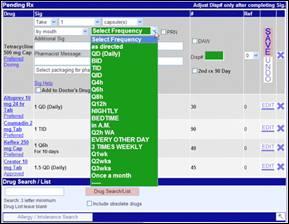The article about Pediatric Associates in CA has a nugget with a potentially outsized impact: the implication that VFC vaccines…
News 3/09/10
Surescripts reports that e-prescribing rates tripled from 2007 to 2009, with an estimated 18% of all eligible prescriptions now being sent electronically. The number of prescribers routing prescriptions doubled from 2008 to 2009, and now includes 25% of all office-based physicians.
In case you missed this last week, CCHIT announced plans to expand its certification programs to Oncology and Women’s Health.
eDr.Rx says their prescription management application will be supported on the Apple iPad device.
Speaking of Apple, the company just announced its Wi-Fi-enabled iPad goes on sale April 3, with pre-ordering starting March 12th. Suggested retail prices for the iPad will range from $499 for the 16B model to $699 for the 64GB. The 3G equipped models will hit the market in late April, though you can also pre-order starting March 12th.
The AAFP sends a letter to CMS, pointing out several details of the proposed meaningful-use criteria that the AAFP finds “unworkable, excessive or redundant, and will actually impede the very goals of the legislations.” Criticized items included CPOE (too much administrative burden on physicians), e-prescribing (too high a threshold), and the providing of electronic records to patients (48 hours is not sufficient time for providers to provide together, especially when weekends are involved.) The AAFP concludes:
CMS should significantly modify the proposed rule to ensure participation by the majority of eligible physicians so that we can continue to transform our health care system rapidly toward more patient-centered, coordinated, comprehensive and reliably high quality care.
Today I successfully whittled my email down by a few hundred, with only a hundred or so to go. Bummer that I am just now reading the invite from some friends who wanted to catch a drink at HIMSS. I suppose the fact that I got at least one email form every HIMSS exhibitor somehow makes for that. Or not. I did miss a few good news items, so here’s your catch-up.
Quest Diagnostics introduces Care360 EHR, a web-based application developed by MedPlus. Quest is offering physicians a 90 day free trial period for Care360 EHR or its ePrescribing solution. While the free trial sounds great, here is why it is not as good a deal for physicians as it sounds. Implementing an EHR is disruptive. Quest is counting on the fact that physicians won’t want to go through the struggle of getting an EHR to work in their practices and then toss it out, only to have to go through a disruption process with another product. I’d also assume that Quest will charge for training, regardless of whether the practice keeps the EMR or not, so all the practice would really get is a three months of service for free.
St. Croix Regional Medical Center (WI) leverages Imprivata’s OneSign single sign-on application to facilitate its use of NextGen EHR.
Indigo Identityware, another SSO provider, partners with gMed. EMR vendor gMed will offer Indigo MD to its physician clients as a compliment to its core product, plus sell Indigo Acute to hospitals.
Take Care Health Employer Solutions, the country’s largest provider of worksite health and wellness services and pharmacy, says it will deploy Greenway’s PrimeSuite at both new and existing sites. Take Care is a subsidiary of Walgreens and operates clinics in several pharmacies across the country, as well as 700 worksite and retail healthcare centers.
The Ohio State Medical Association (OSMA) names NextGen Healthcare its only preferred vendor for practice management solutions, and only one of two for RCM solutions. OSMA members are eligible for special pricing.
NextGen, by the way, inks a deal with Prime Care Physicians (NY) to deploy NextGen EHR and Practice Management for its 104 providers.
Leveraging its Lean Six Sigma expertise, GE introduces a suite of rapid implementation packages for its EMR and RCM solutions. The rapid install process helps practices deploy EMR in as little as 10 weeks. GE also announces Centricity Business “PowerStart,” which sounds like as option for software with standardized options right out of the box, thus reducing file-build time. Again, the goal is to help organizations deploy faster.
Sandhills Physicians, a 600-member IPA in North Carolina, selects eClinicalWorks EMR/PM solution for its physician member practices. The organization pre-purchased an initial 150 licenses. eClinicalWorks also announces an on-demand deployment option that will allow practices to independently install and activate eCW solutions, though training and workflow analysis must still be scheduled. The goal is to increase flexibility and reduce installation wait times.
Epocrates is designing its own mobile and web-based EHR solution, which it will target to the solo and small physician group market. If Epocrates is able to roll out a product that is as easy to use and affordable as its medical terminology application, then it will likely be a big hit. Currently over 900,000 clinicians worldwide use Epocrates’ medical terminology product.
athenahealth and DaVita Inc. join forces to deliver an integrated, web-based EHR and RCM solution for nephrologists. athenahealth also partners with US Bancorp and its subsidiary Elavon to launch an integrated payment processing service to streamline checkout processes for physicians and patients. The new Credit Card Plus solution will link to athenaCollector.
One more athenahealth item: athenahealth and Sermo partner to query physicians’ views on such topics as EHR and the financial health of practices. Early survey results indicate that 80% of physicians hold a favorable view of EHRs, though most believe they are expensive to purchase and maintain.
Mark Newman of EHR Associates weighs the pros and cons of various EHR technologies (particularly client/server versus SaaS.) Good read, especially if you are a newbie.






Re: AAFP conclusion – looks like something ran together there…